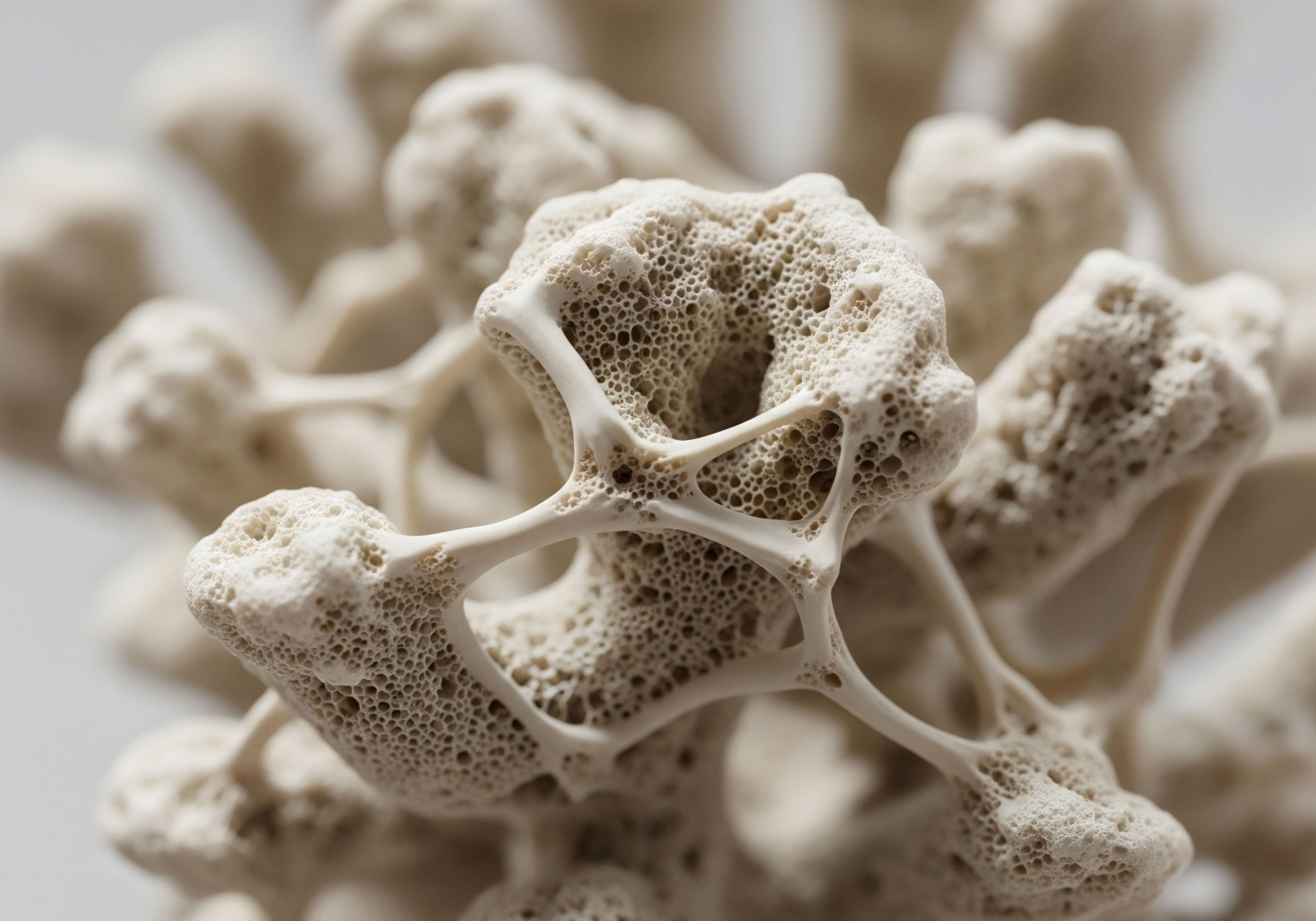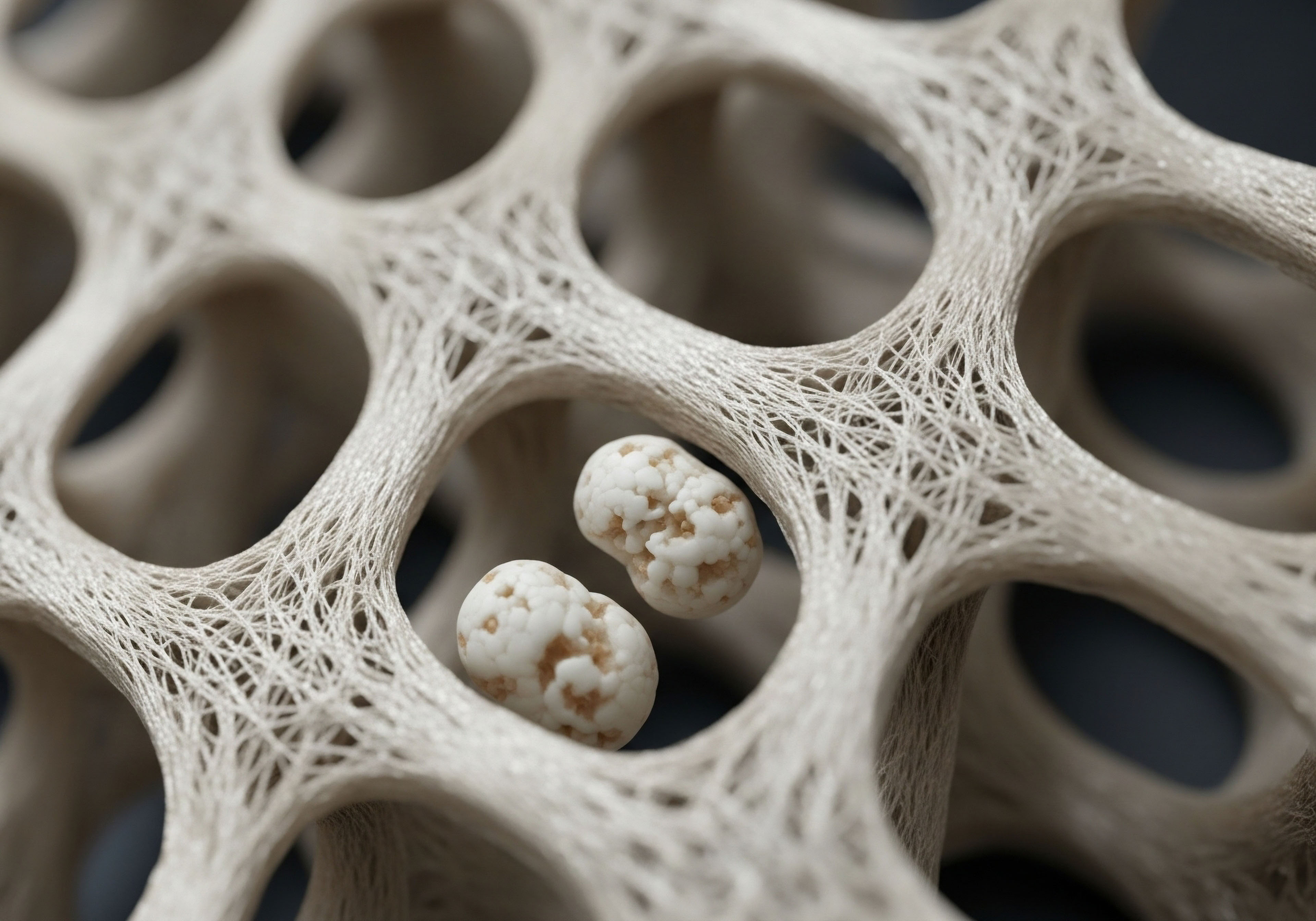

Fundamentals
Experiencing a shift in your vitality, perhaps a subtle but persistent dip in energy, a change in body composition, or a less robust sense of well-being, can feel disorienting. Many men attribute these changes to the inevitable march of time, a natural part of aging.
Yet, often, these sensations are not simply about getting older; they are signals from your intricate biological systems, particularly your endocrine system, indicating a need for recalibration. When your body’s internal messaging service, the hormonal system, begins to falter, the effects ripple across every aspect of your existence.
For men, a decline in testosterone, often addressed through hormonal optimization protocols, can be a central piece of this puzzle. However, receiving a prescription for testosterone replacement therapy (TRT) is merely the initial step on a more comprehensive journey toward reclaiming optimal function. The true art of biochemical recalibration lies in understanding that external hormone administration works in concert with your internal environment, and no single intervention operates in isolation.
Your diet, the very fuel you provide your body, acts as a powerful lever in this process. It influences how well your body responds to exogenous testosterone, how effectively it manages related hormonal pathways, and how it mitigates potential side effects.
Without a thoughtful approach to nutrition, the full benefits of TRT may remain elusive, leaving you feeling as though something is still missing. This exploration will guide you through the specific dietary considerations for men undergoing testosterone replacement therapy, moving beyond simplistic food lists to reveal the profound interconnectedness of metabolic function, hormonal balance, and overall vitality.
We will translate complex clinical science into empowering knowledge, allowing you to understand your own biological systems more deeply and to reclaim a state of robust health.
Dietary choices significantly influence the effectiveness of testosterone replacement therapy and overall hormonal balance.

Understanding Hormonal Balance and Metabolic Function
The human body operates as a symphony of interconnected systems, with hormones serving as the conductors, orchestrating countless physiological processes. Testosterone, a primary androgen, plays a pivotal role in male physiology, influencing muscle mass, bone density, fat distribution, energy levels, and mood.
When testosterone levels decline, whether due to age, lifestyle, or underlying medical conditions, a cascade of symptoms can arise, including fatigue, reduced muscle mass, changes in libido, and shifts in emotional equilibrium. Testosterone replacement therapy aims to restore these levels, alleviating symptoms and improving overall well-being.
However, the introduction of exogenous testosterone impacts other hormonal pathways, particularly the conversion of testosterone to estrogen through the enzyme aromatase. Maintaining a harmonious balance between testosterone and estrogen is essential for optimal outcomes, preventing potential side effects such as gynecomastia or fluid retention.
Metabolic function, encompassing how your body processes energy from food, is inextricably linked to hormonal health. Conditions such as insulin resistance, obesity, and non-alcoholic fatty liver disease (NAFLD) are frequently associated with lower testosterone levels. Conversely, optimizing testosterone levels through TRT can improve metabolic parameters, including reductions in waist circumference, body mass index, and triglycerides, while enhancing insulin sensitivity.
This bidirectional relationship underscores the importance of dietary interventions that support both hormonal equilibrium and metabolic efficiency. A diet that promotes stable blood sugar, reduces systemic inflammation, and supports liver health creates a more receptive environment for TRT to exert its beneficial effects.

Foundational Dietary Principles for TRT Support
A successful TRT journey is significantly amplified by a diet rich in whole, unprocessed foods. This approach provides the essential macronutrients and micronutrients required for optimal hormone production, metabolic regulation, and overall cellular function. Prioritizing nutrient-dense choices over highly refined or processed items is a fundamental principle.
Processed foods often contain unhealthy trans fats, excessive sodium, and artificial additives that can contribute to inflammation and hormonal disruption. Instead, focusing on fresh fruits, vegetables, lean proteins, and whole grains supplies the body with the necessary building blocks and co-factors for health.
Maintaining consistent meal timing, particularly a nutritious breakfast, helps stabilize blood sugar levels, which is crucial for hormonal balance. Regular hydration is also paramount; adequate water intake supports cellular function, detoxification processes, and blood volume, indirectly aiding testosterone levels by enhancing physical performance and recovery.
The initial steps in dietary optimization for men on TRT involve a shift toward a balanced, anti-inflammatory eating pattern. This includes ∞
- Whole Foods Emphasis ∞ Prioritize fruits, vegetables, lean proteins, and complex carbohydrates.
- Processed Food Reduction ∞ Minimize intake of sugary beverages, refined grains, and foods high in unhealthy fats.
- Consistent Hydration ∞ Drink ample water throughout the day to support metabolic processes.
These foundational dietary considerations establish a robust internal environment, allowing the body to respond more effectively to hormonal optimization protocols.


Intermediate
Once the foundational dietary principles are established, a deeper consideration of specific macronutrient ratios and micronutrient intake becomes essential for men undergoing testosterone replacement therapy. The goal extends beyond merely supporting testosterone levels; it involves optimizing the intricate interplay of the endocrine system, managing potential side effects, and promoting long-term metabolic health. This requires a precise understanding of how dietary components influence hormonal pathways and cellular function.

Macronutrient Calibration for Hormonal Homeostasis
The balance of protein, fats, and carbohydrates in your diet significantly impacts hormonal signaling and metabolic efficiency. Each macronutrient plays a distinct role in supporting the body’s response to exogenous testosterone and maintaining overall physiological equilibrium.

Protein Intake and Muscle Protein Synthesis
Protein is the fundamental building block for muscle tissue, and adequate intake is paramount for men on TRT, especially those aiming to increase lean body mass. Testosterone itself enhances muscle protein synthesis, the process by which muscle fibers repair and regenerate following physical activity.
To fully capitalize on this anabolic effect, a consistent supply of high-quality protein is necessary. Lean sources such as chicken, fish, eggs, and plant-based proteins like legumes and tofu provide the essential amino acids required for muscle growth and repair.
While protein is crucial, excessive intake, particularly above 3.4 grams per kilogram of body weight daily, may paradoxically decrease total testosterone levels. This suggests a need for a balanced approach, where protein intake supports muscle anabolism without overburdening metabolic pathways.
A general guideline often suggests aiming for approximately 0.8 to 1 gram of protein per pound of body weight, depending on activity levels and muscle-building goals. Distributing protein intake across all meals and snacks throughout the day can further support muscle maintenance and recovery.

The Role of Healthy Fats in Hormone Production
Dietary fats are not merely energy sources; they are indispensable for hormone production, including testosterone. Cholesterol, derived from dietary fats, serves as a primary precursor for steroid hormones. Incorporating a balance of monounsaturated and polyunsaturated fats, particularly omega-3 fatty acids, is crucial for supporting hormonal balance and cardiovascular health. Sources such as avocados, olive oil, nuts, seeds, and fatty fish like salmon provide these beneficial fats.
Conversely, minimizing the consumption of unhealthy fats, such as trans fats found in many processed and fried foods, and excessive saturated fats, is important. These fats can contribute to systemic inflammation and hormonal disruption. Research indicates that low-fat dietary patterns may be associated with decreased testosterone levels, highlighting the importance of including healthy fats in the diet.

Complex Carbohydrates and Insulin Sensitivity
Carbohydrates provide the body’s primary energy source, particularly for individuals engaging in regular physical activity. For men on TRT, maintaining stable blood sugar levels is vital for metabolic health and overall hormonal regulation. Complex carbohydrates, found in whole grains, vegetables, and fruits, offer a sustained release of energy and help maintain insulin sensitivity.
Insulin resistance, a condition where the body’s cells do not respond effectively to insulin, is frequently linked to lower testosterone levels. Testosterone replacement therapy has been shown to improve insulin sensitivity in men with low testosterone, making dietary choices that support this a powerful adjunct.
Prioritizing complex carbohydrates over refined sugars and processed grains helps prevent rapid spikes in blood glucose, which can contribute to insulin dysregulation and inflammation.

Micronutrient Imperatives for Endocrine Support
Beyond macronutrients, specific vitamins and minerals act as essential co-factors in testosterone synthesis, estrogen metabolism, and overall cellular health. Deficiencies in these micronutrients can undermine the effectiveness of TRT and impede optimal outcomes.

Zinc, Magnesium, and Vitamin D ∞ The Hormonal Trio
Zinc plays a direct role in Leydig cell function and testosterone synthesis. Zinc deficiency can lead to lower testosterone levels and hypogonadism. Including zinc-rich foods such as oysters, lean beef, pumpkin seeds, and legumes can support efficient hormone metabolism.
Magnesium is essential for over 300 biochemical reactions, including those related to testosterone production and energy metabolism. Higher magnesium intake correlates with better testosterone levels, muscle mass, and physical performance. Green leafy vegetables, nuts, seeds, and legumes are excellent sources of magnesium.
Vitamin D, often referred to as a pro-hormone, is crucial for testosterone synthesis and overall hormonal health. Leydig cells, responsible for testosterone production, possess vitamin D receptors. Low vitamin D levels are linked to lower testosterone. Sunlight exposure is a primary source, but dietary sources like fatty fish and fortified foods, or supplementation, can help maintain optimal levels.
Optimizing micronutrient intake, particularly zinc, magnesium, and vitamin D, is fundamental for supporting testosterone synthesis and overall hormonal health during TRT.

Cruciferous Vegetables and Estrogen Metabolism
Cruciferous vegetables, including broccoli, cauliflower, Brussels sprouts, and kale, contain compounds such as indole-3-carbinol (I3C) and its metabolite diindolylmethane (DIM). These compounds are believed to influence estrogen metabolism by promoting the production of beneficial estrogen metabolites and supporting the liver’s detoxification pathways. While research on DIM’s direct impact on male body composition is limited, these vegetables support a healthy balance of estrogens, which is particularly relevant for men on TRT who may experience increased estrogen conversion.
A diet rich in fiber, found abundantly in fruits, vegetables, whole grains, nuts, and seeds, also plays a role in hormonal balance. Fiber aids gut health, which is crucial for metabolizing and eliminating excess hormones, including estrogen, preventing their reabsorption into the bloodstream. This process helps maintain hormonal equilibrium and can mitigate issues related to estrogen dominance.

Lifestyle Factors and Dietary Intersections
Dietary considerations for men on TRT extend to managing lifestyle factors that intersect with hormonal health. Alcohol consumption, sleep quality, and stress levels all influence the endocrine system and can impact the effectiveness of therapy.

Alcohol Consumption and Hormonal Impact
Excessive alcohol consumption can negatively affect testosterone levels by disrupting the hypothalamic-pituitary-gonadal (HPG) axis, the hormonal pathway regulating testosterone production. Alcohol can also increase the conversion of testosterone into estrogen and place additional stress on the liver, which is vital for processing hormones.
While moderate alcohol use may not significantly undermine TRT, regular or heavy drinking can impede progress and exacerbate hormonal imbalances. It is generally recommended to limit alcohol intake while undergoing TRT to prevent these adverse effects.

Sleep Quality and Nutritional Support
Adequate, high-quality sleep is as important for hormonal health as diet and exercise. Sleep deprivation can lead to decreased testosterone levels and increased cortisol, the stress hormone. While TRT can improve energy and mood, which may indirectly support better sleep, high doses of testosterone can sometimes exacerbate sleep problems like insomnia.
Dietary choices can support sleep quality; avoiding large meals, caffeine, and high-sugar foods close to bedtime can prevent sleep disruption. Conversely, a diet rich in magnesium and complex carbohydrates can promote restful sleep, indirectly supporting optimal testosterone levels.

Stress Management and Dietary Strategies
Chronic stress elevates cortisol levels, which can suppress testosterone production. Dietary strategies can help manage stress hormones. Foods rich in omega-3 fatty acids, such as fatty fish, can help reduce cortisol levels. Complex carbohydrates can boost serotonin, a calming brain chemical, and stabilize blood sugar.
Magnesium-rich foods like leafy greens and nuts also contribute to stress reduction. A diet that supports a healthy gut microbiome, through fiber and fermented foods, can also influence cortisol secretion and stress resilience via the gut-brain axis.
By integrating these intermediate dietary considerations, men on TRT can create a more supportive internal environment, enhancing the therapeutic benefits and promoting a holistic sense of well-being.


Academic
The intricate dance of hormonal regulation in the male body, particularly when augmented by exogenous testosterone, demands a deep understanding of metabolic pathways and their susceptibility to dietary influence. Moving beyond general nutritional advice, this section delves into the molecular and physiological mechanisms by which specific dietary considerations impact the efficacy and safety of testosterone replacement therapy.
The focus here is on the interconnectedness of the endocrine system, the liver’s role in hormone metabolism, the gut microbiome’s influence on systemic inflammation, and the delicate balance of oxidative stress.

Hepatic Metabolism and Hormone Processing
The liver serves as a central hub for hormone metabolism, including the synthesis, conjugation, and excretion of androgens and estrogens. For men on TRT, the liver’s capacity to process both endogenous and exogenous hormones is paramount.
Testosterone is metabolized in the liver through various enzymatic pathways, and its conversion to estrogen, primarily estradiol, is catalyzed by the aromatase enzyme, which is abundant in adipose tissue and also present in the liver. Anastrozole, a common adjunct in TRT protocols, functions as an aromatase inhibitor, reducing this conversion and helping to manage estrogen levels.
Dietary factors can significantly influence liver health and its metabolic efficiency. Non-alcoholic fatty liver disease (NAFLD), a condition characterized by excessive fat accumulation in liver cells, is strongly associated with metabolic syndrome and low testosterone. While TRT itself has shown promise in improving liver function and reducing hepatic steatosis in hypogonadal men, dietary interventions are critical for supporting this process.
A diet that mitigates NAFLD and supports liver detoxification includes ∞
- Reduced Sugar and Refined Carbohydrates ∞ Excessive intake contributes to hepatic fat accumulation and insulin resistance.
- Adequate Protein ∞ Supports liver detoxification pathways and provides amino acids for enzyme synthesis.
- Healthy Fats ∞ Monounsaturated and polyunsaturated fats, particularly omega-3s, can reduce liver fat and inflammation.
- Antioxidant-Rich Foods ∞ Fruits, vegetables, and certain spices (e.g.
turmeric) protect liver cells from oxidative damage.
The liver’s capacity to conjugate and excrete hormones is also influenced by nutrient availability. B vitamins, particularly B12 and folate, and methyl donors like betaine and choline, are involved in methylation pathways that facilitate estrogen detoxification. Supporting these pathways through diet ensures efficient hormone clearance and prevents the recirculation of metabolites that could contribute to hormonal imbalance.

The Gut Microbiome and Systemic Inflammation
The trillions of microorganisms residing in the human gut, collectively known as the gut microbiome, exert a profound influence on hormonal balance and systemic inflammation. This intricate ecosystem plays a role in metabolizing hormones, influencing nutrient absorption, and modulating immune responses.
An unbalanced gut microbiome, or dysbiosis, can lead to increased intestinal permeability, allowing bacterial toxins to enter the bloodstream and trigger chronic, low-grade inflammation. This systemic inflammation has been directly linked to lower testosterone levels and can interfere with Leydig cell function, the primary site of testosterone production in the testes.
The gut microbiota also influences the enterohepatic circulation of estrogens. Certain gut bacteria produce an enzyme called beta-glucuronidase, which can deconjugate estrogens that have been processed by the liver for excretion. This deconjugation allows estrogens to be reabsorbed into circulation, potentially contributing to elevated estrogen levels.
Dietary strategies to support a healthy gut microbiome and mitigate inflammation include ∞
| Dietary Component | Mechanism of Action | Examples |
|---|---|---|
| Fiber-Rich Foods | Acts as prebiotics, nourishing beneficial gut bacteria; binds to and facilitates excretion of excess hormones. | Whole grains, fruits, vegetables, legumes, nuts, seeds. |
| Fermented Foods | Introduces beneficial probiotic bacteria, promoting gut diversity and balance. | Yogurt, kefir, kimchi, sauerkraut. |
| Omega-3 Fatty Acids | Possess potent anti-inflammatory properties, reducing systemic inflammation. | Fatty fish (salmon, mackerel), flaxseeds, chia seeds, walnuts. |
| Antioxidants | Combat oxidative stress and reduce inflammatory markers. | Berries, leafy greens, turmeric, dark chocolate. |
By fostering a diverse and balanced gut environment, men on TRT can reduce systemic inflammation, optimize hormone metabolism, and enhance overall physiological resilience.

Oxidative Stress and Androgenic Status
Oxidative stress, an imbalance between the production of reactive oxygen species (ROS) and the body’s antioxidant defenses, can negatively impact testosterone synthesis and overall cellular function. Leydig cells, responsible for testosterone production, are particularly susceptible to oxidative damage due to their reliance on mitochondrial electron transfer for energy. Elevated oxidative stress can reduce the activity of antioxidant enzymes, increase lipid peroxidation, and inhibit the synthesis of testosterone.
Testosterone itself has anti-inflammatory properties, and low testosterone levels are associated with increased pro-inflammatory cytokines. However, conditions like obesity and type 2 diabetes, often linked with low testosterone, are also characterized by increased oxidative stress.
Dietary antioxidants play a crucial role in mitigating oxidative stress and supporting androgenic status. These include ∞
- Vitamin C ∞ A powerful antioxidant that can protect cells from oxidative damage.
- Vitamin E ∞ Works synergistically with other antioxidants to prevent lipid peroxidation.
- Selenium ∞ A trace element that is a component of antioxidant enzymes like glutathione peroxidase.
- Zinc ∞ Acts as a co-factor for superoxide dismutase, another important antioxidant enzyme.
- Phytonutrients ∞ Compounds found in fruits and vegetables, such as polyphenols in pomegranates, have demonstrated antioxidant effects.
A diet rich in colorful fruits, vegetables, nuts, and seeds provides a broad spectrum of these protective compounds, helping to maintain cellular integrity and support optimal testosterone production.

Dietary Interactions with TRT Adjuncts
The comprehensive TRT protocol often includes adjunct medications like Anastrozole and Gonadorelin, each with specific physiological roles that can be influenced by dietary considerations.

Anastrozole and Dietary Considerations
Anastrozole, an aromatase inhibitor, reduces estrogen levels by blocking the conversion of testosterone to estradiol. While there are no strict food prohibitions with Anastrozole, certain dietary choices can support its function and mitigate potential side effects.
Anastrozole can sometimes be associated with changes in cholesterol levels and bone density. To support cardiovascular and bone health ∞
- Limit Added Sugars, Saturated Fats, and Salty Foods ∞ These contribute to unfavorable lipid profiles and inflammation.
- Increase Calcium and Vitamin D Intake ∞ Essential for bone health, found in dairy, leafy greens, fortified foods, and fatty fish.
- Cruciferous Vegetables ∞ While not directly interacting with Anastrozole, their compounds (I3C, DIM) support estrogen metabolism pathways, potentially complementing the medication’s action.
It is important to avoid herbal supplements containing concentrated phytoestrogens (e.g.
soy protein supplements, black cohosh, flaxseed supplements) as they could theoretically interfere with Anastrozole’s effectiveness by mimicking estrogen. However, consuming these foods as part of a regular, balanced diet is generally not considered problematic.

Gonadorelin and Nutritional Impact
Gonadorelin, a synthetic form of gonadotropin-releasing hormone (GnRH), stimulates the pituitary gland to release luteinizing hormone (LH) and follicle-stimulating hormone (FSH), thereby maintaining natural testosterone production and fertility. There are generally no specific dietary restrictions or food interactions with Gonadorelin.
Its primary role is to modulate the HPG axis, and its effects are largely independent of direct dietary influence. However, a healthy, balanced diet that supports overall endocrine function and reduces systemic stress will always create a more conducive environment for any hormonal therapy to perform optimally.
In conclusion, a deep understanding of dietary considerations for men on TRT extends far beyond basic nutrition. It involves a sophisticated appreciation of how macronutrients, micronutrients, and specific food compounds interact with complex biological systems ∞ from hepatic metabolism and gut health to oxidative stress and the precise actions of adjunct medications. By meticulously calibrating dietary intake, individuals can significantly enhance the therapeutic benefits of TRT, mitigate potential challenges, and truly reclaim a state of integrated physiological well-being.

References
- Al-Qudimat, Ahmad, Raed M. Al-Zoubi, Aksam A. Yassin, Mustafa Alwani, Omar M. Aboumarzouk, Khaled AlRumaihi, Raidh Talib, and Abdulla Al Ansari. “Testosterone treatment improves liver function and reduces cardiovascular risk ∞ A long-term prospective study.” Journal of Clinical Urology, 2024.
- Grossmann, Mathis, David J. Handelsman, and Peter Angus. “Testosterone therapy reduces hepatic steatosis in men with type 2 diabetes and low serum testosterone concentrations.” Journal of Clinical Endocrinology & Metabolism, 2024.
- Grossmann, Mathis, David J. Handelsman, and Peter Angus. “Metabolic Syndrome, Hepatic Steatosis and Testosterone ∞ A Matter of Sex.” MDPI, 2024.
- Kelly, Damien M. and Thang H. Jones. “Long-term testosterone therapy improves liver parameters and steatosis in hypogonadal men.” Taylor & Francis Online, 2013.
- Maggio, Marcello, Fulvio Lauretani, and Salvatore S. G. “The Anti-Inflammatory Effects of Testosterone.” Journal of Clinical Endocrinology & Metabolism, 2014.
- Malkin, Christopher J. Peter J. Pugh, and Richard D. Jones. “Effect of Testosterone Replacement on Endogenous Inflammatory Cytokines and Lipid Profiles in Hypogonadal Men.” Oxford Academic, 2004.
- Michnovicz, J. J. and H. L. Bradlow. “Altered estrogen metabolism and excretion in humans following consumption of indole-3-carbinol.” Nutrition and Cancer, 1991.
- Reed, Katharine E. Juliana Camargo, Jill Hamilton-Reeves, Mindy Kurzer, and Mark Messina. “Neither soy nor isoflavone intake affects male reproductive hormones ∞ An expanded and updated meta-analysis of clinical studies.” Reproductive Toxicology, 2021.
- Sato, Kazunori, Hideaki Iida, and Yoshiharu Yano. “Association between Fish Intake and Serum Testosterone Levels in Older Males ∞ The Hitachi Health Study II.” Journal of Nutritional Science and Vitaminology, 2020.
- Sert, Mehmet, and Ahmet Yilmaz. “Serum testosterone levels and oxidative stress in type 1 diabetes, type 2 diabetes, and obesity.” Endokrynologia Polska, 2024.
- Wrzosek, Michał, Dariusz Włodarek, and Jakub Woźniak. “The effect of zinc, magnesium and vitamin D on testosterone synthesis in men.” Polish Journal of Sports Medicine, 2018.
- Yilmaz, Ahmet, and Mehmet Sert. “Oxidative Stress, Nutritional Antioxidants, and Testosterone Secretion in Men.” Austin Publishing Group, 2015.
- Zamir, Zaid, et al. “Testosterone supplementation improves insulin responsiveness in HFD fed male T2DM mice and potentiates insulin signaling in the skeletal muscle.” PLOS ONE, 2019.
- Whittaker, Joseph, and George Harris. “High-protein diets and testosterone.” Nutrition and Health, 2023.
- Grossmann, Mathis, et al. “Effects of testosterone treatment on body fat and lean mass in obese men on a hypocaloric diet ∞ a randomised controlled trial.” European Journal of Endocrinology, 2016.

Reflection
As you conclude this exploration into the specific dietary considerations for men on testosterone replacement therapy, consider the knowledge you have gained not as a rigid set of rules, but as a compass for your personal health journey. Understanding the intricate connections between your diet, your hormones, and your overall metabolic function empowers you to make informed choices. This is not about passive adherence to a protocol; it is about becoming an active participant in your own well-being.
The path to reclaiming vitality is deeply personal, reflecting your unique biological blueprint and lived experiences. The insights shared here are designed to equip you with the scientific understanding necessary to collaborate effectively with your healthcare provider, asking precise questions and advocating for a truly personalized approach.
Your body possesses an innate intelligence, and by providing it with the right signals ∞ through thoughtful nutrition, strategic movement, and mindful living ∞ you can support its capacity for self-regulation and optimal function. Let this knowledge be the catalyst for a renewed commitment to understanding and nurturing your biological systems, allowing you to live with sustained energy, clarity, and purpose.



